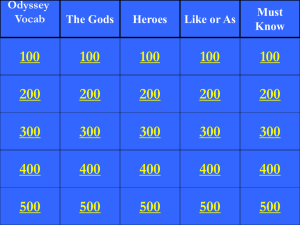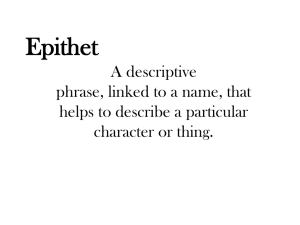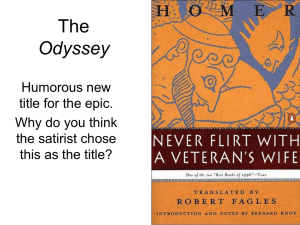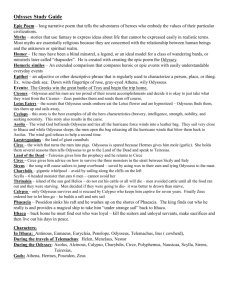Heroes of the Trojan War – almost entirely from Homer`s
advertisement
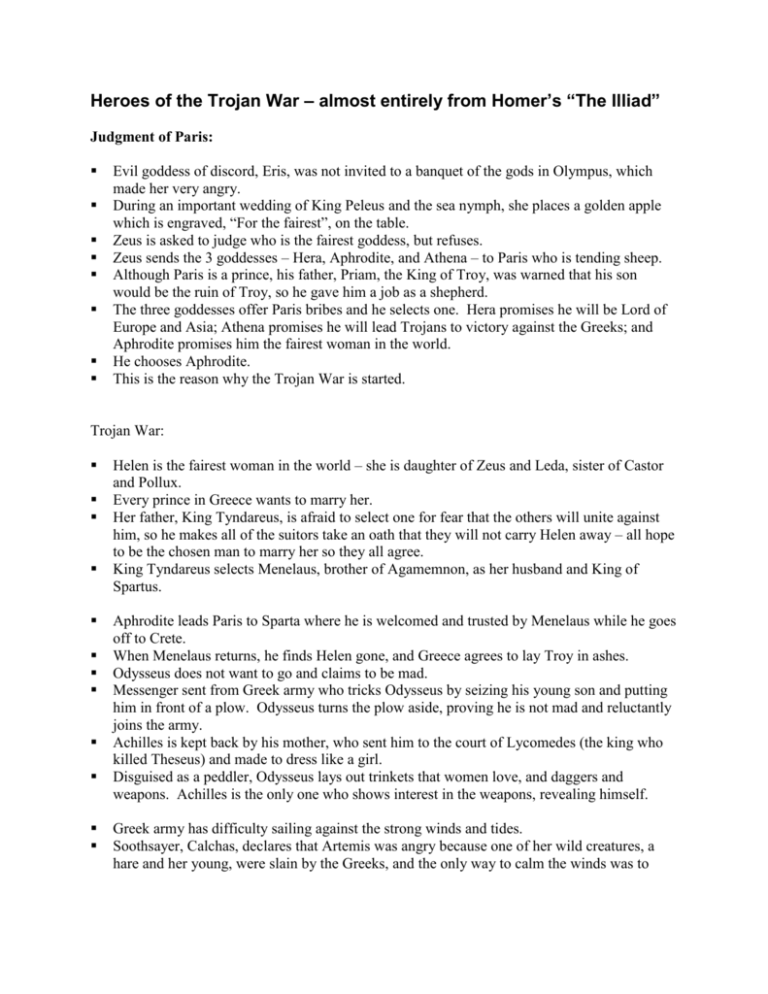
Heroes of the Trojan War – almost entirely from Homer’s “The Illiad” Judgment of Paris: Evil goddess of discord, Eris, was not invited to a banquet of the gods in Olympus, which made her very angry. During an important wedding of King Peleus and the sea nymph, she places a golden apple which is engraved, “For the fairest”, on the table. Zeus is asked to judge who is the fairest goddess, but refuses. Zeus sends the 3 goddesses – Hera, Aphrodite, and Athena – to Paris who is tending sheep. Although Paris is a prince, his father, Priam, the King of Troy, was warned that his son would be the ruin of Troy, so he gave him a job as a shepherd. The three goddesses offer Paris bribes and he selects one. Hera promises he will be Lord of Europe and Asia; Athena promises he will lead Trojans to victory against the Greeks; and Aphrodite promises him the fairest woman in the world. He chooses Aphrodite. This is the reason why the Trojan War is started. Trojan War: Helen is the fairest woman in the world – she is daughter of Zeus and Leda, sister of Castor and Pollux. Every prince in Greece wants to marry her. Her father, King Tyndareus, is afraid to select one for fear that the others will unite against him, so he makes all of the suitors take an oath that they will not carry Helen away – all hope to be the chosen man to marry her so they all agree. King Tyndareus selects Menelaus, brother of Agamemnon, as her husband and King of Spartus. Aphrodite leads Paris to Sparta where he is welcomed and trusted by Menelaus while he goes off to Crete. When Menelaus returns, he finds Helen gone, and Greece agrees to lay Troy in ashes. Odysseus does not want to go and claims to be mad. Messenger sent from Greek army who tricks Odysseus by seizing his young son and putting him in front of a plow. Odysseus turns the plow aside, proving he is not mad and reluctantly joins the army. Achilles is kept back by his mother, who sent him to the court of Lycomedes (the king who killed Theseus) and made to dress like a girl. Disguised as a peddler, Odysseus lays out trinkets that women love, and daggers and weapons. Achilles is the only one who shows interest in the weapons, revealing himself. Greek army has difficulty sailing against the strong winds and tides. Soothsayer, Calchas, declares that Artemis was angry because one of her wild creatures, a hare and her young, were slain by the Greeks, and the only way to calm the winds was to sacrifice a royal maiden, Iphigenia, the eldest daughter of the Commander in Chief, Agamemnon. Agamemnon agrees and sends for her, saying that he has arranged for her to marry Achilles. She is carried to the alter to be killed. The winds die down, but this evil price paid will come back to haunt them. When they reach Troy, Protesilaus is the first to leap ashore, knowing this would make him the first to die. Hector is a great defender of Troy, and equally great is Achilles, fighting for the Greeks, but both will fall in the war. War waged for 9 years before a quarrel between two Greeks – Achilles and Agamemnon. Chryseis, daughter of Apollo’s priest, was carried off by the Greeks and given to Agamemnon. Her father came to beg her release, but Agamemnon refused. Apollo shot fiery hours down on the Greeks. By this time, the gods are very much divided as to which side they want to win the war. Finally, the fight comes down to Paris and Menelaus, the two who started the war. Menelaus wins the combat, but Paris is protected by Aphrodite and escapes unharmed. Hector returns home to his wife for a brief visit, and leaves her for the last time. He continues to show himself a great warrior, as with his help, the Trojans manage to push the Greeks back almost to their ships. Achilles, still brooding in his tent, refusing to fight, unwilling to accept any bribe or gift to fight on. Hera gets involved and entices Zeus with her beauty to lure him away from controlling the war. Her scheme works, and the Greeks begin to gain ground. When Zeus wakens from his trance, he is angry with Hera and she blames Poseidon. Zeus tells Poseidon to back off, and again the Trojans lead the war. Patroclus, Achilles good friend, decides to fight using Achilles armor (thinking they will believe it is Achilles). When he meets Hector face to face, he is killed, and Hector takes the armor of strength. Achilles sets out to avenge his friend’s, Patroclus’, death. He kills Hector and drags his dead body around the walls of Troy. Zeus is angered at this abuse of a corpse. Priam goes to Achilles, begs him for Hectors corpse so he can have a worthy burial, and Achilles agrees. Hector is mourned for 9 days, burned in the pyre, placed into an urn wrapped in purple cloth, and buried under great stones. The Fall of Troy – Most of this story comes from the Aeneid by Virgil In his last battle before he dies, Achilles kills Memnon. Paris kills Achilles with an arrow to the heel of his foot. This was his vulnerable spot – his mother dipped him in the River Styx to make him immortal, but she held him by his foot, and it was missed. Ajax is angry when Odysseus gets Achilles arms and seeks revenge on Menelaus and Agamemnon. Ajax goes to their quarters at night and Athena strikes Ajax with a fit of madness. He kills herds of sheep, thinking they are an army. When he returns to his senses and realizes what he has done, he kills himself. Odysseus captures Helenus, the prophet, who tells the Greeks that Troy will not fall until someone fights against the Trojans with Hercules bow and arrow. Hercules bow and arrow was originally given to Prince Philoctetes, they now belong to Odysseus. Most sacred image of Pallas Athena, in the city, was the Palladium, and Troy would not fall as long as the Trojans had it, so Odysseus steals it. Odysseus comes up with the idea of the wooden horse to break through the walls of Troy. SHOW THIS PART OF THE VIDEO – TROY Adventures of Odysseus – Homer Greeks neglect to honor the gods after their victory against Troy – Athena and Poseidon were angry! Bring trouble to the soldiers. Odysseus wanders for 10 years and spent 10 years battling troy – his son is a man when he returned home. Everyone thinks Odysseus is dead and demands Penelope marry. Suitors come from everywhere, none of which Penelope or her son Telemachus like. Suitors are rude, greedy, drink all of Odysseus’ wine and slaughter and eat his cattle. They say they will not leave until Penelope agrees to marry one of them. She weaves each day and unravels each night a shroud for Odysseus’ father, Laertes. She tells the suitors she will pick one of them when she is done with the shroud. Her hand maiden tells the suitors what she is doing. Athena decides to help Odysseus and expresses her desire during a gathering in Mount Olympus. At this time, he is held captive by the nymph, Calypso. Zeus sends Hermes to tell Calypso to release Odysseus. Athena travels to Ithica to see Telemachus, and she is angered by the suitors’ behavior (she is disguised as a sefaring man). She tells Telemachus to see Nester and Menelaus for news of his father’s fate. He assembles the suitors and asks for a ship and rowers, and they mock at him with laughter. He prays to Athena who appears to him as Mentor and tells Telemachus that a ship will be made ready for him (Athena never reveals her identity to Telemachus). Nester welcomed Telemachus, but he knew nothing of Odysseus. Telemachus travels to Sparta by chariot to see Menelaus. Telemachus is welcomed (Helen is there and recognizes Telemachus), and Menelaus proceeds to tell what he knows of Odysseus – that he was held captive by Calypso. Hermes, meanwhile, flies to see Calypso, she releases Odysseus and helps him build a sturdy raft. He finishes it in 5 days. After 17 days at sea, never sleeping, Odysseus is shaken by a storm brought on by Poseidon upon his return from Etheopia. Ino, a kindly goddess, offers to protect him by giving him a veil and telling him to swim to shore. He follows her advice and swims for two days and nights. Athena calms the waters, Poseidon is satisfied, and Odysseus arrives safely on the shore of a country belonging to Phaeacians – a kind people. The king’s daughter, Nausicaa, found Odysseus and rescuses him. The queen and king welcome him and the next day, he tells them about his travels over the past 10 years. o The Lotus Eaters – men who ate the sweet flower no longer longed for home. Odysseus drags his men to the ship and chains them fast to save them. o Cyclops Polyphemus – full account in Part I, Chapter 4. Poseidon is Polyphemus’ father and angered further at Odysseus. Poseidon swears that Odysseus will reach his own country only after long misery and the loss of all of his men. o Country of Winds – ruled by King Aeolus (keeper of the winds – appointed by Zeus). He gives Odysseus a leather sack of storm winds to make it home safely. Men think the sack is filled with gold and they cut it open, causing the ship to be lost at sea. o Ship blown to shore of Laestrygons – gigantic people who are cannibals. All ships are destroyed accept for the one Odysseus is on. o Aeaea – the realm of Circe – she is a beautiful and dangerous witch who turns men into beasts. She changes Odysseus’ men into swine. Odysseus leaves and Hermes appears with an herb that will protect Odysseus from Circe’s magic. Circe is so amazed that nothing happens to Odysseus when he drinks her potion that she is willing to do anything for him. She frees his men and they stay there for a year enjoying her hospitality. When they are ready to leave, she tells them what they must to next to make it home. o Cross the river Ocean and beach the ship on Persephone’s shore. They must enter the dark world of Hades with an offering of sheep blood to draw out the ghost of the dead prophet, Teiresias. Sheep blood will attract all of the dead, but he must turn them away and use his sword against them until Teiresias speaks to him. He tells Odysseus that when he returns home, he will find trouble, but in the end he will prevail. o They pass the island of the Sirens and the crew stuffs their ears with wax but, Odysseus is tied to the mast so he can hear their song and not perish. o Loses six men in a passage between Scylla and Charybdis in a sea peril. o Island of the Sun – men grow hungry and they slay and eat the sacred Oxen. o Sea tempest destroys his ship and he lands on Calypso’s Island. After his story, the King provides him with a ship and sends him home. He lands in Ithica and is greeted by Athena who is disguised as a shepherd. She reveals herself to him and tells him what they must do to right the wrong that the suitors had done to him and his family. Athena disguises Odysseus as an old beggar and he spends an evening with Eumaeus, a faithful and trustworthy man who takes care of him. Meanwhile, Athena reaches Telemachus and tells him that when he reaches home he must first meet with Eumaeus, the swineherd. Telemachus returns, Odysseus reveals himself to his son, and Eumaeus is dispatched to tell Penelope of Telemachus’ return. The next day, Odysseus enters his dwelling and is recognized by Argos, a dog he bred before leaving for Troy. He is mocked and laughed at by the suitors. Penelope is angered by the way her suitors treat the beggar. She dresses in her finest and tells the suitors that they should bring her presents if they want to suit her properly. They give her gifts. Penelope entertains the beggar, and her hand maiden wash his feet. She recognizes a scar on his leg and knows it’s Odysseus. She agrees to keep his secret. A banquet is prepared for the suitors and Penelope tells them she will marry the man who can string Odysseus’ bow. Odysseus is handed the bow, stings it, and sends an arrow through twelve rings. The banquet hall is closed off and all were slaughtered by Odysseus (with the help of Athena) except the bard. Odysseus is finally reunited with his family. Adventures of Aeneas – written by Virgil From “The Aeneid”, the greatest of Latin poems. This story uses Roman names; for example Ulysses is Latin for Odysseus. Part 1 – from Troy to Italy Aeneas, the son of Venus, was among the most famous of the heroes who fought the Trojan War. Held to be the real founder of Rome. After the war, he and many Trojans traveled westward. Came upon the Harpies and nearly killed the creatures. Next landing, they met Hector’s wife, Andromache. The men are treated with hospitality and given advice about their journey. They land on the island of the Cyclopes, unknowingly, and are warned by a poor wretch of a man who was left behind, that they must immediately flee or they will be killed. They take his advice and leave. They come upon a storm so fierce that the floor of the ocean is revealed to them. Juno surely behind it as she hates the Trojans because of the judgment of Paris. She promised Aeolus, the king of the winds, her best nymph and this was the storm he spurred. Neptune did not like his sister, Juno, interfering, so he calmed the waters enabling them to land in a place near Carthage. Juno’s plan is to divert Aeneas from Italy by having him fall in love with Dido, the woman who founded Carthage. Venus interferes. She speaks to Jupiter for help. He had promised her that Aeneas would be the ancestor of a race who would some day rule the world. Venus is helped by Cupid to make Dido fall in love with Aeneas. The two of them rule together. Eventually, Jupiter dispatches Mercury to Carthage with a message for Aeneas, asking how long he plans to waste his time here in idle luxury? He says that he must leave and seek the kingdom which is his destiny. Dido begs him to stay, but Aeneas refuses. She kills herself when he leaves. Part 2 – The decent into the lower world The journey from Carthage to the west coast of Italy is relatively easy. Aeneas was told by the prophet, Helenus, that he must find the cave of the Sibyl of Cumae, a woman of deep wisdom, who could tell the future. She tells him to travel to the underworld for information he would need from his father, Anchises. Aeneas must travel first to the forest and find a golden bough which he must take with him to be admitted to Hades. He was led to the tree by two doves, the birds of Venus. Sibyl tests Aeneas courage as he proceeds through the underworld. Aeneas reaches a river and is ferried across by Charon. Charon is at first reluctant as he is supposed to ferry only the dead. When he sees the golden bough, he agrees to take Aeneas across the river. In the Field of Mourning where the unhappy lovers exist, he comes across Dido, but she will not speak to him. He comes to a crossroad and is told to fasten the golden bough to the wall and take the road to the right which leads to the Elysian Fields, where Aeneas would find his father. Here dwelt the great and good dead heroes, poets, priests, and all who are remembered for helping others. He meets with his father who leads him to the river of forgetfulness, of which the souls on their way to live again in the world above must all drink. Here Aeneas meets his descendants – the future Roman - waiting to drink and return. His father gives him instructions how he would best establish his home in Italy and avoid or endure all the hardships that lay before him. Part 3 – The war in Italy When they arrive, the Latins and Rutulians are fiercely opposed to the Trojans settling in their land. Grandson of Saturn and King of the City, Latium, welcomed them. He had been warned by the spirit of his father, Faunus, not to marry his daughter, Lavinia, to any man of the country but to a stranger who was soon to arrive. He sends a messenger to Aeneas about the fate of his daughter and believes Aeneas is the one to marry her. Juno again steps in. She summons Alecto, one of the Furies from Hades. Her affects cause the Queen Amata, wife of Latinus to oppose the marriage. Turnus, who was among the favored to marry Lavina, wages war against the Trojans. The third and final offense is when Ascanius, Aeneas’s young son, kills a favored, tame and beautiful pet stag belonging to a farmer. The king Latinus shuts himself in the palace and allows fate to run its course. Custom in the city held that when war was determined upon, the two folding-gates of the temple of the god Janus, always closed in times of pease, should be unbarred by the king. Latinus was not present for this, so Juno swept down from heaven and opened them herself. The war progresses. Father Tiber, the god of the great river they were encamped near, visits Aeneas in a dream, telling him to go upstream to where Evander dwelt, a king of a poor little town, and Aeneas would get the help he needs. Evander shows Aeneas around his city which will one day house the great structures of Rome. He gives Aeneas information that will help him win the favor of the Latins and Rutulians and turn them against Turnus. Turnus employed the help of the Etruscans, whose king Mezentius was the former ruler and so hated by the people for the horrible way in which he tortured men. He tied the living and dead together, killing the living with the rotting stench of the dead. After a great deal of battling, Turnus and Aeneas meet in a single combat. Virgil’s poem ends with Turnus’ death. Aeneas marries Lavinia and found the Roman race. House of Atreus Used by tragic poet Aeschylus in three great plays: the Agamemnon, the Libation Bearers, and the Eumenides. Ill-fated family begins with the wicked deed of TANTALUS – son of Zeus Son – Pelops – has 2 sons, Atreus and Thyestes Daughter – Niobe – has 7 daughters and 7 sons Atreus – 2 sons – Agamemnon and Menelaus Agamemnon – led Greeks against Troy Wife – Clytemnestra Children – Iphigenia, Orestes, Electra Brother – Menelaus – husband of Helen Tantalus and Niobe: Tantalus, son of Zeus, highly honored by the gods. He is the only mortal allowed to eat at their table and taste their nectar and ambrosia. The gods agree to come to a banquet, held at his palace, where his behavior is atrocious. He had his only son, Pelops, killed, boiled in a great cauldron, and served to the gods. He did this to show how easy it was to deceive the gods. The gods were not deceived and put him in a pool in Hades where he is tormented, unable to drink or eat. When he bends to drink or reaches for fruit to eat, the water and food disappears. Son Pelops is restored to life with an ivory shoulder which was mistakenly eaten by one of the goddesses (Demeter or Thetis). Later Greeks protested the story for its cannibal deeds. Pelops the only one of Tantalus’ descendants not marked out by misfortune. In a horse race against her father, he marries Hippodamia. Niobe suffered worse doom than any. She married Amphion, a son of Zeus and musician. Eventually Niobe becomes much like her father , Tantalus, and expects people to worship her. She compares herself to Apollo and Artemis saying she is better. They had two children and she has 14. She demands that she is worshiped and sacrifices made to her not the gods. When the gods hear her, they come down and kill all of her children. Niobe was struck with grief and changed into a stone which forever was wet with tears. Pelops two son born – Atreus and Thyestes. Thyestes fell in love with his brother’s wife and made her false to her marriage vows. Atreus found out and killed his brother’s two little children, cut limb from limb, boiled them and served them to their father. Atreus was king, Thyestes had no power. The atrocious crime caused Atreus’ children and grandchildren to suffer. Agamemnon and his Children: Orestes slays Aegisthus in his return from Troy. As told in the Illiad, Aegisthus killed Agamemnon with the aid of his (Agamemnon’s) wife, Clytemnestra, while they were eating. Killed by his wife’s lover. Next account of the story, written by Aeschylus in 450 B.C., the motive for Agamemnon’s death is no longer the guilty love of a man and woman, but a mother’s love for a daughter killed by her own father, and a wife’s determination, Clytemnestra, to avenge that death by killing her husband. Menelaus, son of Atreus, lives happily with Helen after the Trojan war. Agamemnon, also son of Atreus, returns from Troy and is haunted by his past misdeeds, especially the sacrifice of Iphigenia, who was killed by Agamemnon, her father, who yielded to the army, impatient for good winds to sail to Troy. This death loomed over the City. His wife, Clytemnestra, who found her daughter dead, took on a lover, and everyone knew it but him. These are the things that greeted him upon his return. Cassandra, Priam’s daughter was a gift to Agamemnon, and he tells Clytemnestra to take chare of her. They enter the house never again to come out. Prophetess passing the closed door and says that two more will die in the future, including she herself. The queen, Clytemnestra, kills Agamemnon, considering it an execution rather than murder, for killing his own daughter. Her lover, Aegisthus, the youngest child of Thyestes, rules beside her. Aegisthus, knowing that somehow this murder would be avenged, most likely by Agamemnon’s son Orestes, makes life difficult for Electra. Orestes is away from the house and Electra awaits his return. Orestes visits the oracle and is told by Apollo to kill his mother and her lover, so he returns home, along with his cousin and friend Pylades. Orestes pretends to be a messenger with news that Clytemnestra’s son, Orestes, is dead. He is allowed into the house, kills Aegisthus, and his mother tries to persuade him to spare her life. He follows her into the house and kills her. He is plagued by visions that are not really there and wanders in many lands. His wrong-doing begins to fade and he asks the goddess Athena to make him clean for his misdeeds. He was the first to ask the gods forgiveness and banished the evil spirit which haunted his house, thus ending the curse. Iphigenia Among the Taurians Greeks were opposed to human sacrifice, so writer Euripides created an alternative ending to the sacrifice of Iphigenia. When they tried to slaughter Iphigenia, Artemis came to her rescue and made her disappear, putting a young deer in her place. Artemis had taken her to the land of the hostel land, Taurians (today the Crimea), where she was priestess of Artemis temple. After many years, a ship lands with a crew that includes two young men, Orestes and Pylades. Orestes, although forgiven of his misdeeds, was still haunted by the images, and again visited the oracle where Apollo said that he must travel to the Taurian country and bring away the sacred image of Artemis from her temple. The men are caught and brought before Iphigenia for sacrifice. She refuses to sacrifice any more men and tries to save them. She asks them to take a letter to her brother, Orestes, and finds out he is standing right in front of her. Iphigenia plans to take them to the water and cleanse their sins before the sacrifice, and the three escape to the ship. The wind keeps them from escaping, but Athena steps in and tells the king to leave them alone. He agrees and finally they leave. The Royal House of Thebes Theban family written about by Sophocles Cadmus – brother of Europa Wife – Harmonia, daughter of Are and Aphrodite Children – Semele, Ino, Agave, Autonoe Cadmus and his children: When Europa carried away by the bull, her father sent his sons to look for her. Cadmus went to Delphi to ask Apollo where she was. Apollo told him to follow a heifer and build a city at the spot where she lay down to rest. In this way Thebes was founded. First Cadmus had to fight and kill a terrible dragon that guarded the only spring of drinking water. Athena appears to him and tells him to sow the earth with the dragon’s teeth from which sprang armored men who killed each other. Only five remained and helped him build the city. Herodotus says he introduced the alphabet into Greece. His wife was Harmonia, the daughter of Ares and Aphrodite. Aphrodite gave Harmonia a necklace made by Hephaestus that would bring disaster to a later generation. They had four daughters and one son. Semele, mother of Dionysus, perished before the unveiled glory of Zeus. Ino was the wicked stepmother of Phrixus, the boy who was saved from death by the ram of the Golden Fleece. Her husband, Melicertes, was struck with madness and killed their son. With his dead body, she leaped into the sea, but both were saved by the gods. She was made a sea-goddess, the one who saved Odysseus when his raft was shattered. Agave driven mad by Dionysus, believed her son Pentheus was a lion and killed him with her own hands. Autonoe had to endure her son dying a terrible death. He was turned into a stag by Artemis when he saw her naked. His transformation was inwardly and he was fearful of everything. Cadmus and Harmonia move to Illyria and the gods change them into serpents – not as punishment, but simply because it was their fate. Oedipus: King Laius of Thebes was third in descent from Cadmus. Prophecy of oracle warned Laius he would die at the hands of his son. When Oedipus born, his feet bound together and taken to a mountain to die. Laius away from home and killed by bandits Solves the riddle of the Sphinx – What creature goes on four feet in the morning, on two at noonday, on three in the evening? “In childhood he creeps on hands and feet; in manhood he walks erect, and in old age, he helps himself with a staff.” This cures the country of famine and he marries his mother… unknowingly. Plague is brought on and Apollo declares that it will continue until death of Laius is avenged. Oedipus longs to find out who the murderer was, eventually finds out that it was he himself. His mother, Jocasta, kills herself when she hears the news, and he blinds himself out of shame. Antigone: Has two sons, Polyneices and Eteocles, and two daughters, Antigone and Ismene. Creon, Jocasta’s brother, was given the thrown. Oedipus was driven out of the city and Antigone went with him to guide him in his blindness. When he leaves, Eteocles succeeds the throne, even though he is the younger son, and Polyneices takes refuge in Argos and tries to bring harm to Thebes. Oedipus and Antigone come to Colonus, near Athens, and eventually he dies with both of his daughters at his side. His daughters return to Thebes to find their brothers at war with each other. They cannot take sides. Polyneices joined by six chieftains, one of whom was Amphiaraus, who was a prophet and didn’t want to go. He allowed his wife to decide and she was bribed by Polyneices with the necklace (given as a wedding present) that once belonged to Harmonia. The two brothers end up killing each other. After their deaths, Creon was in control of Thebes and claimed that Eteocles should be honored with a noble burial, but anyone who buried Polyneices would be put to death. Antigone buries her brother and is put to death. The Seven Against Thebes Taken from Euripides’ play, “The Suppliants” Five of the chieftains who marched with Polyneices were still unburied. Adrastus, the only survivor, and the chieftain’s mothers go before Theseus, King of Athens, and ask to bury the bodies. He says no. Theseus’ mother argues on behalf of the other mothers and he agrees to ask the assembly as it is a democracy. Theseus returns with good news – to tell the Thebans that they wish to be a good neighbor, but they must go to war to give these men a proper burial. Creon would not listent to Theseus’ plea and the Athenians marched against Thebes and conquered them. Theseus himself lit the funeral pyres, and the mothers and wives vowed to return in the next life to avenge what Thebes had done. Ten years later, they returned and brought Thebes to the ground. The Royal House of Athens Most of this is taken from Ovid. Cecrops: First king of Attica named Cecrops – born of a dragon – decided that Athens belonged to Athena. Poseidon, who also wanted the city, brought on a great flood in his anger. In one telling, ownership was put to a vote, and all of the women voted for Athena, and the men voted for Poseidon. There was one more woman than man and Athena won. This bothered the men so they took the vote away from the women. Cecrops was the great-grandfather of Athens’ hero, Theseus. Father, King Erechtheus of Athens, reign brought Demeter and agriculture began. He had two sisters, Procne and Philomela. Procne and Philomela: Procne, the elder of the two sisters, married Tereus of Thrace, a son of Ares who was detestable. The two had a son, Itys. Procne begged Tereus to let her sister visit, and he agreed to travel to get her. When he sees Philomela, he immediately falls in love with her and convinces her father to allow her to leave with him. On the way, he lies and tells her that Procne is dead, tricking her into marrying him. She quickly finds out he is lying and threatens to tell her sister, so he cuts out her tongue and locks her away. Tereus tells Procne that her sister Philomela is dead. She cannot talk, so she weaves a story into a tapestry and gives it to an old woman to give to the queen, Procne. Procne wants to punish her husband so she cuts her son, Itys, into pieces, cooks him and serves him to Thereus. When she tells he what he has just eaten, he is stunned and she and Philomela escape. He later catches up with them, but they are turned into birds – Philomela into a swallow, which only chirps, and Procne a nightingale, which sings beautifully. Porcris and Cephalus: The niece of Procne and Philomela was Procris, who was married happily to Cephalus, a grandson of the king of the winds, Aeolus. Cephalus swept away by Aurora, but still loves Porcris. Aurora says Porcris will not remain faithful in his absence, so he disguises himself and tries to win her love. She never says she loves him, but at last does not argue her love for Cephalus. He is angered and reveals himself and she leaves, hating him for his deception. He eventually realizes his mistake and goes after her. After many years together, they go hunting one morning and separate. Cephalus throws the javelin at a moving object and finds that he has pierced Porcris through the heart. Orithyia and Boreas: Orithyia is a sister of Procris. Boreas, the North Wind falls in love with her, but her father and the Athens are opposed to the marriage. Boreas swept down one day and took her away. They had two sons, Zetes and Calais, who went on the Quest for the Golden Fleece. Creusa and Ion: Creusa is the sister of Procris and Orithyia. While gathering crocuses on a cliff, she was abducted by a man – Apollo. He carried her off to a dark cave. She bore a child in a cave and left him to die. When she returned to the cave, there remained nothing that she left behind and wondered what had happened to him. She eventually marries Xuthus, a foreigner and Greek, but he did not belong to Athens or to Attica. They are unable to have children, and Xuthus wants a son. They travel to Delphi and Creusa goes to a sanctuary where she meets a young man, Ion, who she believes to be her son. He was found by Pythoness, Apollo’s priestess, and raised him as her own. Xuthus arrives and says that Apollo told him that Ion was his son. Pythoness appears with the veil and maiden’s cloak that he was wrapped in when she found him. Creusa describes the embroidery on them and Ion believes she is his mother.






